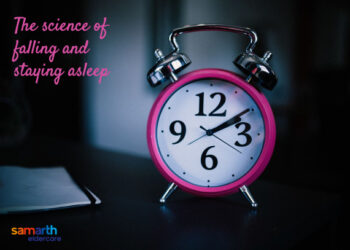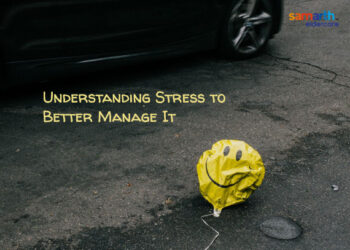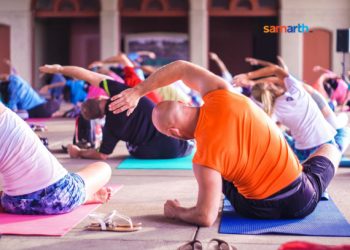Most of us take sleep for granted! Some of us get it when we are not supposed to and some of us don’t get it when we want to. Sleep-related troubles are common in most adults. Perhaps, the only time when we humans sleep peacefully is during infancy, which is why the age-old adage of ‘sleep like a baby’ came into being. It is said adults of any age, including older adults, need anywhere between 7 to 9 hours of sleep every day. While older adults openly acknowledge or comment on lack of sleep, many young people do not even understand that they are getting less sleep.
A slight sleepy feeling is normal after lunch, even according to experts. And a catnap at the time is rejuvenating for most people. However, feeling sleepy throughout the day, not being able to focus on our work, feeling grumpy and irritated, etc. could be signs of sleep deprivation. The key point here is the quality of sleep. You may have spent eight hours in bed, but may not have had a good sleep. A good night’s sleep will keep us awake and alert for most of the day.
Understanding sleep deprivation

Join Now >
What kind of sleep deprivation are you suffering from? It is essential to understand the same to take corrective actions. If you get less sleep for a night or two in continuation, then it is acute sleep deprivation. This will probably lead to you being less active and more irritated for a day or two. However, chronic sleep deprivation is when you have not been getting good quality sleep over weeks, months, or years. The second one is more dangerous as people start ‘getting used to the phenomenon and do not realise that is affecting their health, both in the short-term and long-term. It keeps affecting the cognitive performance progressively with time, which means all their activities will take a beating.
The acute sleep deprivation caused one by one-or-two-night outs can worsen your mood the next day, and you will find it hard to focus on anything. You will feel sleepy, especially if you are driving or sitting idle like attending a meeting. You may also experience fatigue as there is a physical effect of sleep deprivation. A chronically sleep-deprived person will worse after a night out!
Chronic sleep deprivation has more long-term health issues like depression, an increased risk of developing cardiovascular diseases, and a weakening immune system. They also tend to have elevated inflammatory markers in their bloodstream. It can even to obesity as the lack of sleep affects appetite hormones as well.
Aging and sleep changes
It’s not a myth that aging affects sleep. It is said that sleep decreases by about 30 minutes or so every decade, from mid-life. It also becomes more fragmented as the REM sleep amount declines. REM sleep accounts for about 25% of an adult’s sleep time and is the time when we dream vividly. It plays a significant role in our memory, learning, and mood. It starts within 90 minutes of our falling asleep and then happens in cycles every 90 minutes. The body undergoes many changes during this phase like Rapid Eye Movements (REM), increased heart rate, increased brain activity, and more. Lack of REM sleep affects our health progressively.
Also, as we age, our circadian rhythm changes. The circadian rhythm is our daily pattern which our body is used to for most processes, regulated by certain hormones and daylight. As we age, this rhythm advances, which means we may feel sleepy early on than when young and then wake up earlier too. It also weakens as we age, affecting our quality of sleep. So, sleeping a little less as we age is normal. However, what needs to be managed is the acute or more dangerous chronic sleep deprivation as mentioned above.
Top 5 reasons for lack of sleep
Here are the top 4 reasons affecting the sleep of seniors.
- Physical health issues like heart and lung conditions, gastric issues like heartburn, arthritis pain, urinary issues, mental health issues like anxiety and depression, neurodegenerative diseases such as Alzheimer’s and Parkinson’s, or side effects of medications for any of these. Understanding the underlying issue and managing it can help the sleep issue. Of course, for those with Alzheimer’s or Parkinson’s, the challenges are many and may need specialised help.
- Sleep disorders like sleep apnea, snoring, etc. are some forms of sleep disorders related to how people breathe when they sleep. Sleep apnea, especially obstructive sleep apnea (OSA) can be dangerous. In this, the person can pause breathing due to obstructions in sleep passages. The risk of developing sleep disorders goes up as we age. The risk factor is more for men and obese people. OSA increases the risk of stroke, coronary artery diseases, heart diseases, etc. Timely diagnosis and treatment can help improve quality immensely.
- Restless Leg Syndrome (RLS) is another common cause of sleep deprivation. In this condition, people keep moving their legs as they try to fall asleep. It can cause itching, restlessness, or crawling sensations as people try to fall asleep. This is not a serious condition, is rather common and may be seen more as we age. Females have a higher risk of having RLS, along with those who have poor health and low iron levels in the body. RLS has been linked to anxiety and depression and some medications can worsen it. Professional help can be sought to counter RLS and have a better sleep.
- Insomnia is the most common cause of sleeplessness affecting many people in their mid and older age. In this condition, people are just not able to fall asleep. One study confirms that almost 25% of the population may be affected by this condition. This causes anxiety, depression, cognitive decline, and many other long-term health issues. Treatment can help people to overcome the condition.
Also, following some generic tips to get good sleep can help people get better quality sleep. What is essential is to understand the seriousness of the nature of the sleep issue we face and seek help, if and when required.











